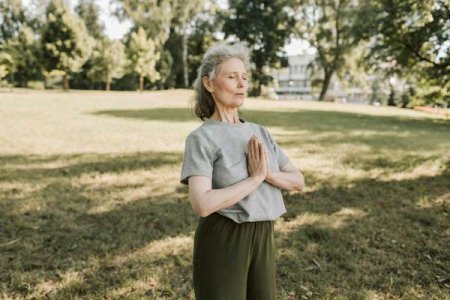Live Longer with this Doctor's Unusual but Free Health Tip
By
Danielle F.
- Replies 5
In the quest for longevity, we often find ourselves inundated with advice on what to eat, what exercises to do, and which habits to break. But what if the secret to a longer life was as simple and cost-free as changing the way we breathe? This is the intriguing proposition put forward by Dr Janine Bowring, a naturopathy doctor from Canada with a wealth of 25 years of experience, who recently took to TikTok to share her unconventional wisdom.
Dr Bowring's advice is not about what we breathe in, but rather how often we do it. She suggests that the average adult's 15 to 20 breaths per minute is excessive and that slowing down our breathing rate could be the key to unlocking a longer life. 'If you can slow your breathing down to about five point five breaths per minute, that is related now to longevity,' she explains.
The rationale behind Dr Bowring's recommendation is rooted in a comparison with other animals. She notes that creatures with a slower breathing rate, such as elephants and whales, tend to have longer lifespans, while those like mice, which take 90 to 250 breaths per minute, have much shorter lives. The connection between rapid breathing and a shorter lifespan is also tied to stress; when we're stressed, our breathing quickens, and stress is well-known to be associated with a host of health issues and a potentially reduced lifespan.

Dr Bowring's tip is to consciously slow down our breath, which is a practice often incorporated into meditation and yoga. These activities are not only relaxing but could also be powerful tools in the pursuit of a longer, healthier life.
While this may sound like a stretch, there is scientific evidence that lends some credibility to the idea. A study at Massachusetts General Hospital involving mice found that those living in environments with lower oxygen levels—just 11 per cent compared to the usual 21 per cent—lived up to 50 percent longer. The theory is that reduced oxygen intake may lead to less cellular damage and more efficient cellular repair processes, thereby decelerating the ageing process.
However, it's important to note that these findings are based on animal studies, and human trials are necessary to confirm whether the same effects would be observed in people. Until such studies are conducted, the full benefits of reduced breathing rates on human longevity remain speculative.
Watch Dr Bowring's full video here:
Source: @j9naturally/TikTok
Nevertheless, the concept of controlled breathing and its potential health benefits is not new. Practices such as pranayama in yoga have long emphasized the importance of breath regulation for mental and physical well-being. So, while we await more concrete evidence, there's certainly no harm in trying out Dr Bowring's advice—after all, it's completely free and could be a relaxing addition to your daily routine.
At the Seniors Discount Club, we're always on the lookout for interesting and accessible ways to enhance the lives of our members. So why not give this breathing technique a try? It might just be the breath of fresh air your routine needs.

And remember, dear readers, to stay informed and engaged with all the latest news, tips, and stories, sign up for our FREE newsletter. It's your daily dose of wellness and wisdom delivered straight to your inbox.
Dr Bowring's advice is not about what we breathe in, but rather how often we do it. She suggests that the average adult's 15 to 20 breaths per minute is excessive and that slowing down our breathing rate could be the key to unlocking a longer life. 'If you can slow your breathing down to about five point five breaths per minute, that is related now to longevity,' she explains.
The rationale behind Dr Bowring's recommendation is rooted in a comparison with other animals. She notes that creatures with a slower breathing rate, such as elephants and whales, tend to have longer lifespans, while those like mice, which take 90 to 250 breaths per minute, have much shorter lives. The connection between rapid breathing and a shorter lifespan is also tied to stress; when we're stressed, our breathing quickens, and stress is well-known to be associated with a host of health issues and a potentially reduced lifespan.

Dr Bowring stated that breathing slowly could contribute to a longer life. Image Credit: Pexels/Vlada Karpovich
Dr Bowring's tip is to consciously slow down our breath, which is a practice often incorporated into meditation and yoga. These activities are not only relaxing but could also be powerful tools in the pursuit of a longer, healthier life.
While this may sound like a stretch, there is scientific evidence that lends some credibility to the idea. A study at Massachusetts General Hospital involving mice found that those living in environments with lower oxygen levels—just 11 per cent compared to the usual 21 per cent—lived up to 50 percent longer. The theory is that reduced oxygen intake may lead to less cellular damage and more efficient cellular repair processes, thereby decelerating the ageing process.
However, it's important to note that these findings are based on animal studies, and human trials are necessary to confirm whether the same effects would be observed in people. Until such studies are conducted, the full benefits of reduced breathing rates on human longevity remain speculative.
Watch Dr Bowring's full video here:
Source: @j9naturally/TikTok
Nevertheless, the concept of controlled breathing and its potential health benefits is not new. Practices such as pranayama in yoga have long emphasized the importance of breath regulation for mental and physical well-being. So, while we await more concrete evidence, there's certainly no harm in trying out Dr Bowring's advice—after all, it's completely free and could be a relaxing addition to your daily routine.
At the Seniors Discount Club, we're always on the lookout for interesting and accessible ways to enhance the lives of our members. So why not give this breathing technique a try? It might just be the breath of fresh air your routine needs.
Key Takeaways
- A naturopathy doctor from Canada, Dr Janine Bowring, has suggested that taking fewer breaths could contribute to a longer lifespan.
- Dr Bowring shared that the average adult breathes too much, and reducing breaths to around five and a half per minute could be linked to longevity.
- The doctor compared breathing rates between different animals, noting that those with slower breathing rates tend to live longer, and stressed the correlation between rapid breathing due to stress and shorter lifespans.
- Some studies, including one involving mice at Massachusetts General Hospital, support the idea that lower oxygen intake may reduce cellular damage and slow ageing, although it is still unproven in humans.







